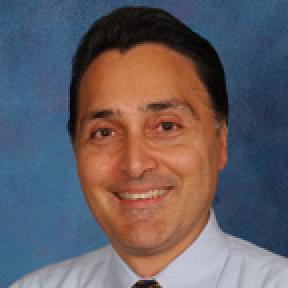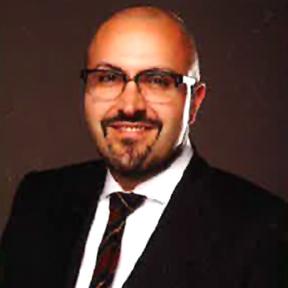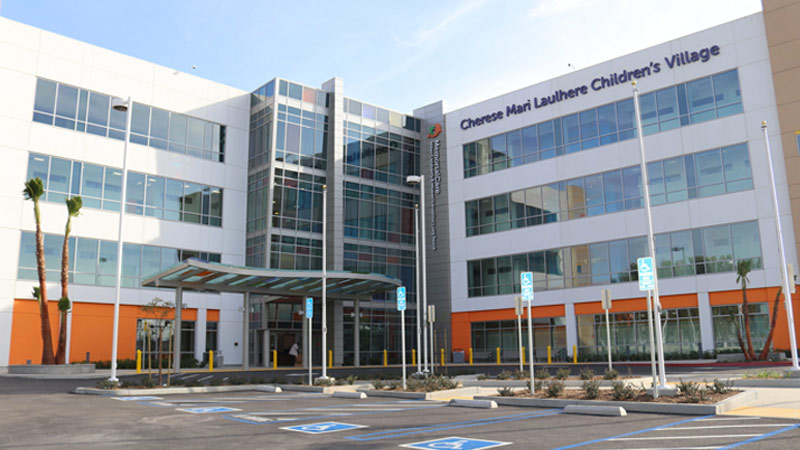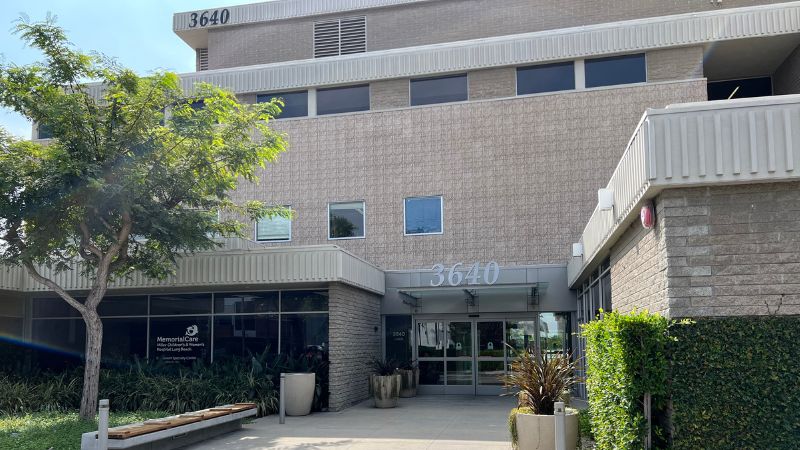The Bickerstaff Pediatric Family Center at Miller Children’s & Women's Hospital Long Beach cares for infants, children, adolescents and pregnant women who are at risk for, or infected with, HIV/AIDS, acute community-acquired illnesses, chronic infections and other immunological disorders. Board-certified infectious disease physicians and the care team also advise on immunization and infectious disease prevention.
The Bickerstaff Center offers a multi-disciplinary, family-centered care approach through their HIV and Infectious Disease Care programs. In partnership with the National Institute of Health (NIH), the Bickerstaff Center participates in national research studies, such as International Maternal, Pediatric and Adolescent AIDS Clinical Trials Group (IMPAACT), to determine successful treatment regimens. The Bickerstaff team provides more than 7,000 hospital consultations for children staying overnight at
Miller Children’s and outpatient follow-up visits annually. The Bickerstaff care team often works closely with other pediatric specialists.
Designated CCS Center
The Bickerstaff Pediatric Family Center is an approved California Children’s Services (CCS) Special Care Center for Immunology and Infectious Disease. Miller Children’s is a major referral center for pediatric infectious disease cases in the Southern California region, receiving patients from up to
30 miles away.
Miller Children’s Stands Apart
- A significant number of patients at the Bickerstaff Family Center are enrolled in IMPAACT research study protocols and track their results in a national research database.
- All physicians who work in the Bickerstaff Center are pediatric infectious disease
board-eligible/certified. - For the past 20 years, there hasn’t been a single perinatal HIV transmissions among mothers followed in the HIV program. The Bickerstaff Center’s HIV-infected pregnant mothers have been delivering healthy, HIV-negative babies since 1995.
- On-campus translator and literature available in Khmer (Cambodian) and Spanish.
In addition to treating children with HIV, Miller Children’s infectious disease physicians provide evaluation, diagnosis and treatment therapy for children with immunological disorders. Conditions treated include, lymphadenopathy, tuberculosis, meningitis, infectious issues in special hosts and bone and joint infections. This could also include infections involving the lung, skin/joint/bone, brain and heart. The Bickerstaff Center also has a therapy regiment for congenital infections and methicillin-resistant Staphylococcus aureus (MRSA).
Consultative Care & Case Management
The Bickerstaff Center provides consultative care for children and adolescents, regarding vaccination, post-surgical infections, antibiotic prophylaxis, fever of unknown origin and disease prevention treatment before and after travel — including international travel.
The Bickerstaff Center provides long-term follow-up care such as:
- Protective immunizations, especially in children who need an accelerated or customized immunization schedule
- Infectious disease screenings to provide counseling on infectious disease prevention
- Evaluation of patients with recurrent infections or fevers of unknown origin
- Management of antibiotic treatment failures
- Long-term condition management plan of immune deficiency diseases
Therapy of Immunological Disorders
Immunologic evaluations are completed for patients who are expected to have immunodeficiency.
The most common therapy for these patients is intravenous immune globulin (IVIG) therapy.
Intravenous Immune Globulin (IVIG)
Intravenous immune globulin (IVIG) is a plasma protein replacement therapy given intravenously in children with immune deficiencies, acquired compromised immunity conditions with low antibody levels, acute infections, inflammatory and autoimmune diseases. These children have decreased of abolished antibody production capabilities. The plasma protein contains the pooled IgG (immunoglobulin (antibody) G) extracted from the plasma of over 1,000 blood donors. IVIG therapy effects last between two weeks and three months.
This type of therapy is typical done in the Infusion Center.
Hospital Epidemiology Program
The Bickerstaff pediatric infectious disease physicians also act as consults for all of the hospitalized children at Miller Children’s who may have an infectious disease. The infectious disease physicians attend rounds and recommend a treatment regiment. Also, physicians participate in the surveillance, prevention and control of health care associated infections and epidemiologic aspects of infection at Miller Children’s. The physician team meets monthly to discuss these issues, investigate outbreaks or epidemiology issues and determine the appropriate course of action.
The Bickerstaff Pediatric Family Center at Miller Children’s develops and participates in research programs to evaluate new drug therapies and vaccinations, as well as better comprehend psychological effects and the natural history of HIV infection.
The Bickerstaff Center participates in AIDS Clinical Trials Group (ACTG) and International Maternal, Pediatric and Adolescent AIDS Clinical Trials Group (IMPAACT) research and HIV vaccine protocols sponsored through the National Institutes of Health (NIH) and other clinical studies approved by the Institutional Review Board (IRB) of Memorial Health Services. A large number of patients from the Bickerstaff Center are on IMPAACT studies, giving patients access to the latest therapies.
IMPAACT research studies:
Develop and evaluate safe and effective approaches to prevent mother-to-infant transmission of HIV
- Evaluate treatment for HIV-infected children, adolescents and pregnant women, including treatment and prevention of co-infections
- Evaluate vaccines for the prevention of HIV transmission among adolescents
- Study therapeutic vaccines in search of a cure
These studies allow access to the latest therapies, treatment and vaccines and position the Bickerstaff Center at the forefront of HIV clinical research. As a regional leader, the Bickerstaff Center collaborates with a national consortium to participate in a national database to help answer medical questions or issues that confront or confound HIV care. Each patient is evaluated and a clinical protocol is recommended, based on their individual case.
View Bickerstaff Pediatric Family Center Clinical Trials.
HIV and infectious disease care for these special children and their families are made possible through the following federal, state, and private funding sources:
- National Institute of Health (NIH) / National Institute of Child Health and Human Development (NICHD) through Westat for Clinical Trials
- California Children’s Services (CCS)
- Los Angeles Family AIDS Network (LAFAN)
- Ryan White HIV/AIDS Program – Office of AIDS Programs and Policy (OAPP)
- Bickerstaff Endowment
- Other philanthropic gifts and grants
An infectious disease is any acute community-acquired illness Miller Children’s Bickerstaff Pediatric Family and HIV Center provides up-to-date care in both, in-patient and follow-up settings for children and adolescents at risk for, or infected with, diseases that are contagious.
Immunodeficiency is an immune deficiency, where the child’s immune system's ability to fight infectious disease is compromised or entirely absent. Most cases of immunodeficiency are acquired but some people are born with defects in the immune system. A person who has an immunodeficiency of any kind is said to be immunocompromised. An immunocompromised person may be particularly vulnerable to opportunistic infections, in addition to normal infections that could affect everyone.
Advancing Care through Research
The Miller Children's & Women's research team seeks to produce more meaningful, applicable discoveries that directly improve the health of women and children across our region, both in real time and for future patients.
Centers & Programs
Miller Children’s offers comprehensive evaluation and condition management for infants, children and expectant mothers who are at risk, or infected with HIV/AIDS. This comprehensive care includes HIV testing and counseling, clinical drug and vaccine trials, education, psychological care and medical management of the condition.
In addition to treating children with HIV, Miller Children’s infectious disease physicians provide evaluation, diagnosis and treatment therapy for children with immunological disorders. Conditions treated include, lymphadenopathy, tuberculosis, meningitis, infectious issues in special hosts and bone and joint infections. This could also include infections involving the lung, skin/joint/bone, brain and heart. The Bickerstaff Center also has a therapy regiment for congenital infections and methicillin-resistant Staphylococcus aureus (MRSA).
Your Care Team
The Bickerstaff care team is board certified in general pediatrics and pediatric infectious diseases. The physicians are also highly involved in clinical infectious disease research and epidemiology, the study of transmission and control of disease. Also a Bickerstaff Pediatric Family Center Psychiatrist, a psychiatrist is a physician who specializes in psychiatry, is qualified to diagnose and treat mental disorders and is able to prescribe medications.
Board-Certified/Eligible Pediatric Infectious Disease Physicians




Other Team Members
Nurse specialists are responsible for communication among the child, family, school, primary care physician, team and others involved in the care of the child. The nurse specialist also assists the child and family in obtaining medical supplies, laboratory appointments and other care as needed.
Social workers help provide referrals to a broad range of community based agencies and organizations to assist the child and family in obtaining supportive care and assistance. The social worker also is available to provide crisis counseling, individual and family counseling.
Registered dietitians specializing in HIV-related nutrition, assist children and families in obtaining special equipment and supplies relative to special dietary needs and coordinates with the school and other outside agencies to facilitate optimal regulation and management.
Child Life specialists/assistants can help your child better understand his or her condition and treatment while making him or her feel more comfortable during their stay or visit to Miller Children’s. Through therapeutic activities, including pet therapy visits and arts/crafts workshops, they provide emotional support for parents and children.
Locations
Family Centered Care Approach - Bickerstaff Family Center
The Bickerstaff physicians will ensure that your child’s special health care needs and family concerns are addressed and an individualized care plan is established based upon the contributions and recommendations of the care team, child and family. The entire Bickerstaff Pediatric Family and HIV Center care team realize that families are an important part of the treatment process and work closely with you, whether it’s a first time clinic visit, a follow-up clinic visit or preparing your child for the Infusion Center. Patients and families gain peace of mind as they become familiar with the health care team and establish relationships that will last throughout their journey.
Preparing for the Infusion Center
If needed, Child Life Specialists are on-hand to prepare children for any procedure or test done in the Infusion Center. Children can learn about the procedure, even before it’s scheduled, by taking a pre-admission tour with their family and a Child Life Specialist.
Patient and Family Education
Your child’s pediatric infectious disease physician provides education relative to the diagnosis, treatment and management of your child’s condition. The nurse specialist can offer education and instruction in specific treatments or procedures, growth and development, health and nutrition and general physical health.
Ask a member of the care team if there are any educational materials you can bring home to learn about your child’s illness and how to manage it. There are also special educational materials available to you in the Bickerstaff Pediatric Family Center and the Family Resource Center.



